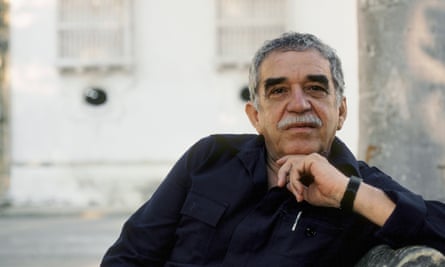“The Unwelcome Publication: Gabriel García Márquez’s Son Discusses Releasing His Father’s Work Without His Consent”
A
A book authored by the Colombian Nobel Prize winner Gabriel García Márquez during the final years of his life, has been released despite his request for it to be destroyed. The novel, “Until August”, was written while the author was dealing with dementia and has now been published a decade after his passing, on what would have been his 97th birthday. His sons have described it as “the result of his final push to continue creating against all odds.” The story follows a woman who embarks on an annual journey to her mother’s burial site on a Caribbean island, where she experiences a series of unexpected sexual encounters.
Before his passing, García Márquez, also known as “Gabo,” became doubtful of his work due to his increasing memory loss. He requested for its destruction. Currently, the manuscript has been accessible to researchers at the Harry Ransom Center in Texas, but the author’s sons, Rodrigo and Gonzalo García Barcha have recently decided to publish it. They believe that it is of higher quality than what their father thought. In their introduction to the novel, they confess, “In a sense of disloyalty, we have chosen to prioritize the enjoyment of his readers over everything else. We hope that if they are pleased, Gabo may possibly forgive us. We have faith in that.”
Gonzalo García Barcha spoke from his residence in Mexico City, acknowledging that it was difficult to oppose his father’s desires. However, he stressed that there are many instances in literary history where individuals were asked to destroy manuscripts, only for them to later become significant works. Personally, he finds relief in the fact that this is the final piece written by Gabo. He believes that his father’s body of work would be incomplete without its publication, as there are no other novels hidden among Gabo’s papers.
Gabriel García Márquez gained international recognition for his works, such as One Hundred Years of Solitude (1967), The Autumn of the Patriarch (1975), and Love in the Time of Cholera (1985). He is widely respected as one of the most influential authors of magic realism, a style that combines elements of fantasy and the supernatural with depictions of everyday life. In particular, his novel One Hundred Years of Solitude draws inspiration from his upbringing in the rural town of Aracataca, which he fictionalized as Macondo, as well as the history and legacy of his grandparents whom he lived with in his youth. His grandfather, Col Nicolás Márquez Mejía, was a veteran of the Thousand Days War (1899-1902) and a committed liberal, greatly shaping his grandson’s political beliefs.

After beginning his profession as a reporter, García Márquez spent a significant portion of his life residing in Paris, Barcelona, and Mexico City, and also had access to a luxurious mansion in Havana courtesy of Fidel Castro. The two shared a complicated friendship. However, he remained connected to and had another residence in Colombia. In 1982, he received the Nobel Prize in literature.
The release of Until August is generating a lot of anticipation. Author Colum McCann expressed his excitement, saying: “It’s a delight to know that there are still discoveries to be made in this world. I would go great lengths to get my hands on a new Márquez book. It’s like finding a refreshing drink after a long journey. Márquez is both admired and necessary, a rare combination in the literary world. I can still vividly remember my initial encounter with Márquez when I read his short story The Handsomest Drowned Man in the World. Everything felt entirely new. He was breaking open the language for me. Every time I read a Márquez book, I am sure to find something new, even after reading it multiple times. But experiencing something for the first time is a special treat.”
According to Pico Iyer, García Márquez had a significant impact on both writers and readers in the constantly evolving literary world. He believes that García Márquez’s revolution included expanding the boundaries of realism to encompass diverse and unconventional settings that were often overlooked by the mainstream literary community. In the words of Kipling, the dreams of one place may be the realities of another, and García Márquez was at the forefront of recognizing the fascinating and sometimes surreal news from faraway places and its potential appeal to those in major literary hubs like London and New York. Iyer also notes that García Márquez paved the way for writers like Salman Rushdie and Abraham Verghese, and many argue that he holds the title of the most influential Nobel laureate in recent history.
Reworded: Skip over the promotion for the newsletter.
after newsletter promotion
Publication after death is not a rare occurrence, and can be a topic of debate. A situation similar to that of García Márquez is when Vladimir Nabokov’s son, Dmitri, chose to publish his final work, The Original of Laura, more than 30 years after his father passed away. During this time, the work had been kept in a bank vault in Switzerland as Dmitri considered his father’s wishes to destroy unpublished work, but also knew that his mother had previously stopped Nabokov from burning the manuscript of Lolita.
In recent times, there have been other instances such as the works of David Foster Wallace, Roberto Bolaño and Stieg Larsson, known for The Girl With the Dragon Tattoo series, who tragically passed away at 50 years old. Following their passing, publishers hired writers David Lagercrantz and Karin Smirnoff to continue the Millennium series. Another prominent case is that of Harper Lee, whose unreleased novel Go Set a Watchman was published in 2015, less than a year before her death. There were allegations that the author was pressured into its publication.
Miranda France, the consultant editor for Spain, Portugal and Latin America for the Times Literary Supplement, has criticized the decision to publish García Márquez’s work Until August posthumously. Upon her initial read, France noticed a lack of García Márquez’s usual expansive vocabulary, which she found to be a poignant experience. She expressed feeling sadness at the absence of his fuller narrative. France believes that this publication may not enhance García Márquez’s existing “terrific” body of work, and may even diminish it.
When García Márquez’s sons were little, their father allowed them to help him destroy drafts of his works-in-progress that he no longer had any use for; he was, his editors and publishers attest, a perfectionist who monitored every change of punctuation and usage in his manuscripts as they made their way to his vast and enthusiastic readership. Now that readership will have the chance to judge whether his final piece of imagination should have seen the light of day.
-
From now until the end of August, you can purchase Gabriel Garcia Marquez’s book (published by Penguin Books Ltd) for £16.99. To contribute to the Guardian and Observer, you can order your copy at guardianbookshop.com. There may be delivery fees.
Source: theguardian.com

